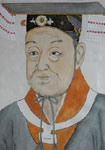试凭阑干春欲暮
故山凝望水云迷。
数堆苍玉髻,千顷碧琉璃。
我本清都闲散客,蓬莱未是幽奇。
明朝归去鹤齐飞。
三山乘缥缈,海运到天池。
试凭阑干春欲暮。宋代。史浩。试凭阑干春欲暮,桃花点点胭脂。故山凝望水云迷。数堆苍玉髻,千顷碧琉璃。我本清都闲散客,蓬莱未是幽奇。明朝归去鹤齐飞。三山乘缥缈,海运到天池。
凝望:(动)目不转睛地看;注目远望。
水云:水和云。多指水云相接之景。水上方的云。指将要下雨的云。
苍玉琉璃:巴利语veluriya或梵文俗语verulia的译音。用铝和钠的硅酸化合物烧制成的釉料,常见的有绿色和金黄色两种,多加在粘土的外层,烧制成缸、盆、砖瓦等。亦指琉璃灯座。
散客:是相对于预约客户的约定性、规律性而指没有预约、没有规律的零散顾客。这类顾客由于没有合同的约定,在选择消费或服务方面自主性较高,且对所选择对象好感较强烈,但其消费地位同时也较不受商品或服务提供方重视。
幽奇归去:归去guīqù回去离家已久,今当归去
齐飞缥缈:高远隐约,若隐若现的样子。
念奴娇(题道隆观) is a poem written by Shi Hao during the Song Dynasty. Here is a translation of the poem:
Gazing from the railing in the fading spring,
Peach blossoms scatter like dots of rouge.
Looking back at the familiar mountains, lost in the mist.
Stacked high are jade hairpins,
Thousand acres of blue glass-like waters.
I am but a carefree traveler in the capital,
Penglai is not yet remote and strange.
Tomorrow morning, returning as cranes soar.
Riding the ethereal Three Mountains,
Navigating the sea to reach Heaven's Lake.
This poem depicts a scene in which the poet is standing on a balcony, observing the beauty of the peach blossoms in the spring. The landscape is described with vivid imagery, painting a picture of mist-covered mountains and shimmering blue waters.
The poet reflects on his own status as a traveler in the capital, not yet experiencing the truly remote and mystical places like Penglai. However, he longs for the freedom and tranquility that comes with returning to nature, depicted by the imagery of cranes flying and journeying through the mountains and sea.
This poem captures the sentiment of longing for a peaceful escape from the bustling city life and the desire to reconnect with nature. It also conveys a sense of wanderlust and the search for something beyond the ordinary in life.
史浩
史浩(1106年—1194年),字直翁,号真隐。明州鄞县人,南宋政治家、词人。高宗绍兴十五年(1144年)进士,由温州教授除太学正,升为国子博士。他向宋高宗建议立太子,以此受知于朝廷,绍兴三十二年,宋孝宗即位,授参知政事。隆兴元年,拜尚书右仆射。淳熙十年,除太保致仕,封魏国公。宋光宗御极,进太师。绍熙五年,薨,年八十九,封会稽郡王。宋宁宗登基,赐谥文惠。嘉定十四年,以子史弥远贵,追封越王,改谥忠定,配享孝宗庙庭。为昭勋阁二十四功臣之一。...
史浩。史浩(1106年—1194年),字直翁,号真隐。明州鄞县人,南宋政治家、词人。高宗绍兴十五年(1144年)进士,由温州教授除太学正,升为国子博士。他向宋高宗建议立太子,以此受知于朝廷,绍兴三十二年,宋孝宗即位,授参知政事。隆兴元年,拜尚书右仆射。淳熙十年,除太保致仕,封魏国公。宋光宗御极,进太师。绍熙五年,薨,年八十九,封会稽郡王。宋宁宗登基,赐谥文惠。嘉定十四年,以子史弥远贵,追封越王,改谥忠定,配享孝宗庙庭。为昭勋阁二十四功臣之一。
